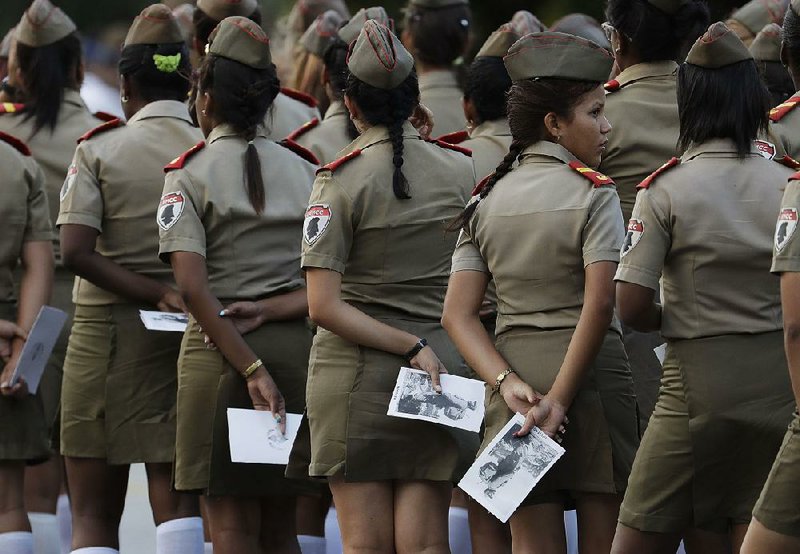HAVANA -- Regional leaders and tens of thousands of Cubans filled Havana's Plaza of the Revolution on Tuesday night for a service honoring Fidel Castro on the wide plaza where the Cuban leader delivered fiery speeches to mammoth crowds in the years after he seized power.
The presidents of Bolivia, Ecuador, Mexico, Panama, South Africa, Venezuela and Zimbabwe, along with leaders of a host of smaller Caribbean nations, flew in to Havana to pay tribute to Castro, who died Friday night at 90.
South African President Jacob Zuma praised Cuba under Castro for its record on education and health care and its support for African independence struggles.
Castro will be remembered as "a great fighter for the idea that the poor have a right to live with dignity," Zuma told the crowd.
The rally began with black-and-white revolution-era footage of Castro and other guerrillas on a big screen and the playing of the Cuban national anthem. Castro's younger brother and successor, President Raul Castro, saluted.
Raul Castro closed the rally with a speech thanking world leaders for their words of praise for his brother, whom he called the leader of a revolution "for the humble and by the humble."
Cuban state media reported that an urn containing Fidel Castro's ashes was being kept in a room at the Defense Ministry, where Raul and top Communist Party officials paid tribute the previous evening.
Two of Fidel Castro's firmest ideological allies, Presidents Nicolas Maduro of Venezuela and Evo Morales of Bolivia, spent several moments paying their respects before a picture of Castro as a young, bearded rebel.
"Cuba is going through a moment of profound shock," Morales said when he arrived the previous evening. "I came to be present during a moment of pain from the loss of my brother, my friend."
President Barack Obama did not send a presidential delegation to Havana for Castro's funeral Sunday. Instead of an official delegation, the White House sent Deputy National Security Adviser Ben Rhodes and Jeffrey DeLaurentis, the top U.S. diplomat on the island, to the ceremony.
Hundreds of thousands of Cubans have been bidding farewell to Castro, pledging allegiance to his socialist ideology and paying tribute before images of the leader as a young guerrilla gazing out over the country he would come to rule for nearly a half century. Schools and government offices across the island were closed Tuesday for a second day.
During the day, lines stretched for hours outside Havana's Plaza of the Revolution, the heart of government power. In Havana and across the island, people signed condolence books and an oath of loyalty to Castro's May 2000 proclamation of the Cuban revolution as an unending battle for socialism, nationalism and an outsize role for the island on the world stage.
"I feel a deep sadness, but immense pride in having had him near," said Ana Beatriz Perez, a 50-year-old medical researcher who was advancing in the slow-moving line with the help of crutches. "His physical departure gives us strength to continue advancing in his ideology. This isn't going away, because we are millions."
"His death is another revolution," said her husband, Fidel Diaz, who predicted that it will prompt many to "rediscover the ideas of the commander for the new generations."
Tribute sites were set up in hundreds of places across the island as the government urged Cubans to reaffirm their belief in a socialist, single-party system that in recent years has struggled to maintain the fervor that was widespread at the triumph of the 1959 revolution.
Many mourners came on their own accord, but thousands were sent in groups by the communist government, which still employs about 80 percent of the working people in Cuba despite the growth of the private sector under Raul Castro.
Inside the memorial, thousands walked through three rooms with near-identical displays featuring the 1962 Alberto Korda photograph of the young Castro in the Sierra Maestra mountains, bouquets of white flowers and an array of Castro's medals against a black backdrop, framed by honor guards of soldiers and children in school uniforms. The ashes of the 90-year-old former president did not appear to be on display.
Signs read: "The Cuban Communist Party is the only legitimate heir of the legacy and authority of the commander in chief of the Cuban Revolution, comrade Fidel Castro."
"Goodbye commander. Your ideas remain here with us," 64-year-old retiree Etelbina Perez said between sobs, dabbing at her eyes with a brown handkerchief. "I feel great pain over his death. I owe my entire life to him. He brought me out of the mountains. I was able to study thanks to him."
The scene was played out on a smaller scale at numerous places across the country.
After 10 years of leadership by Raul Castro, Cuba has found itself riveted once again by the words and images of the man who dominated the lives of generations. Since his death Friday night, state-run newspapers, television and radio have run wall-to-wall tributes to Fidel Castro, broadcasting nonstop footage of his speeches, interviews and foreign trips, interspersed with adulatory remembrances by prominent Cubans.
Information for this article was contributed by Fabiola Sanchez, Juan Zamorano, Peter Orsi of The Associated Press and by Greg Jaffe of The Washington Post.
A Section on 11/30/2016
